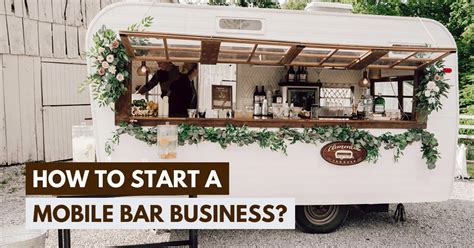Starting a mobile bar business can be a thrilling venture, offering a unique and exciting way to bring people together and create unforgettable experiences. With the growing demand for experiential events and the rise of the gig economy, mobile bars are becoming increasingly popular. However, launching a successful mobile bar business requires careful planning, execution, and attention to detail. In this article, we will guide you through the 7 essential steps to launch a mobile bar business.
Step 1: Research and Planning

Before starting your mobile bar business, it's crucial to conduct thorough research and create a solid business plan. This involves:
- Identifying your target market and understanding their needs and preferences
- Analyzing the competition and finding ways to differentiate your business
- Developing a unique value proposition and brand identity
- Creating a comprehensive business plan, including financial projections, marketing strategies, and operational logistics
- Obtaining necessary licenses and permits to operate a mobile bar business in your state or country
Step 2: Licenses and Permits

To operate a mobile bar business, you will need to obtain various licenses and permits. These may include:
- Liquor license: This is the most critical license for a mobile bar business, allowing you to sell and serve alcohol.
- Food service permit: If you plan to serve food, you will need a food service permit.
- Business license: You will need a business license to operate a mobile bar business in your state or country.
- Health department permit: You may need a permit from the health department to ensure your mobile bar meets health and safety standards.
- Other permits: Depending on your location and type of events, you may need additional permits, such as a permit to operate in a specific park or venue.
Step 3: Equipment and Supplies

To launch a mobile bar business, you will need to invest in equipment and supplies. This includes:
- A mobile bar unit: This can be a trailer, truck, or cart that is designed to serve as a bar.
- Bar equipment: This includes items such as coolers, refrigerators, blenders, and mixers.
- Glassware and utensils: You will need glasses, cups, and utensils for serving drinks and food.
- Inventory: You will need to stock your mobile bar with a variety of drinks, including liquor, beer, and wine, as well as mixers and garnishes.
- Point-of-sale system: You will need a point-of-sale system to process transactions and manage inventory.
Step 4: Staffing and Training

To launch a successful mobile bar business, you will need to hire and train a team of staff. This includes:
- Bartenders: You will need to hire experienced bartenders who can create delicious drinks and provide excellent customer service.
- Servers: You may need to hire servers to help with events and ensure that guests are well taken care of.
- Management: You will need to hire a manager or team of managers to oversee the business and ensure that everything runs smoothly.
- Training: You will need to provide ongoing training to your staff to ensure that they are knowledgeable about your products and services and can provide excellent customer service.
Step 5: Marketing and Promotion

To attract customers and grow your business, you will need to develop a marketing and promotion strategy. This includes:
- Social media marketing: You will need to create a strong social media presence and use platforms such as Instagram and Facebook to promote your business.
- Email marketing: You can use email marketing to promote your business and offer special deals and discounts to customers.
- Networking: You will need to network with event planners, wedding coordinators, and other professionals in the industry to get your business in front of potential customers.
- Advertising: You may need to use paid advertising, such as Google Ads or print ads, to reach a wider audience.
Step 6: Operations and Logistics

To launch a successful mobile bar business, you will need to develop a comprehensive operations and logistics plan. This includes:
- Event planning: You will need to work with clients to plan and execute events, including weddings, corporate events, and parties.
- Inventory management: You will need to manage your inventory to ensure that you have enough products and supplies to meet demand.
- Scheduling: You will need to create a scheduling system to ensure that you have enough staff to cover events and that you can deliver your products and services on time.
- Delivery and setup: You will need to develop a system for delivering and setting up your mobile bar unit at events.
Step 7: Launch and Evaluation

Once you have completed the previous steps, it's time to launch your mobile bar business. This includes:
- Launching your marketing and promotion strategy
- Delivering your products and services to customers
- Evaluating the success of your business and making adjustments as needed
- Continuously improving your products and services to meet the evolving needs of your customers
Gallery of Mobile Bar Business Ideas






FAQ Section
What is a mobile bar business?
+A mobile bar business is a business that provides a mobile bar unit and services to events, such as weddings, corporate events, and parties.
What are the benefits of starting a mobile bar business?
+The benefits of starting a mobile bar business include the ability to work with a variety of clients, the opportunity to be creative and flexible, and the potential for high earnings.
What are the steps to launch a mobile bar business?
+The steps to launch a mobile bar business include researching and planning, obtaining licenses and permits, purchasing equipment and supplies, staffing and training, marketing and promotion, operations and logistics, and launch and evaluation.
We hope this article has provided you with a comprehensive guide to launching a mobile bar business. Remember to stay focused, work hard, and continuously improve your products and services to meet the evolving needs of your customers. Good luck!
